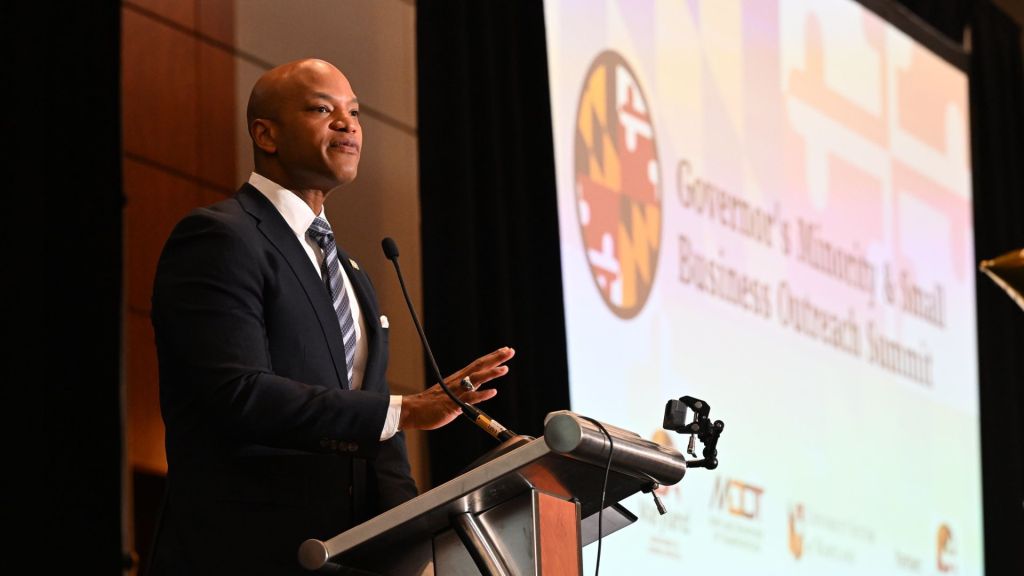By Megan Sayles
AFRO Business Writer
msayles@afro.com
The Governor’s Minority and Small Business Outreach Summit, which took place on Nov. 19 at the Hilton Baltimore Inner Harbor, brought together more than 800 women, minority and veteran business owners to learn about the state procurement process. In Maryland, there are nearly $7 billion in state contracting opportunities, making procurement an effective way to sustain and grow businesses.

Credit:Photo by Pat Siebert
However, in order to secure a contract, entrepreneurs must first submit a winning bid. A summit session led by Philp Rizzi, managing director of capture and proposal at consultancy Deep Water Point and Associates, presented the top 10 ways to lose a bid.
“You don’t want to spend more money on a proposal and more time than it takes to put together a really great proposal. From the smallest companies to the largest companies, anywhere from 20 to 50 percent of the time and effort that goes into a bid is largely wasted,”said Rizzi. “It’s not materially making your proposal better, and not only is that a waste of resources that could have been used for another bid, the wear and tear on your staff is tremendous.”
Below is a review of the common mistakes businesses make and recommendations for best practices.
Not being compliant
Government agencies typically issue requests for proposals (RFPs) for state contracting work. These documents contain a project description, submission requirements, the statement of work, evaluation criteria and terms and conditions. If a business owner fails to read the RFP carefully or they ignore it, they have a bigger chance of noncompliance. It’s also important for them to ask questions if they are confused by a requirement.
Businesses should ensure they follow all instructions and have a solid understanding of the proposal’s scope of work and evaluation process. They can also consider assigning a specific team member to verify compliance.
Inadequate research
Outside of being compliant, it’s also important for proposals to be compelling. Researching the mission, needs, challenges and goals of the customer, in this case the government, is critical to executing an effective bid. As many contracts span a few years, proposals should have a vision for the future and take into account any upcoming changes to the customer’s environment, including funding availability and shifts in leadership. Businesses must also ensure their staff have the requisite credentials for the work and that they understand the pricing landscape to make a competitive bid. Employing an expert and attending trade groups and professional meetings can help with research.
Poor team collaboration
For larger contracts, prime contractors may put together a team of subcontractors to support them in the work. Lousy communication, ineffective engagement and failure to have a clear team strategy can hurt your bid. Every team member should have a meaningful role, and expectations of each person on the contract should be laid out in advance.
Ignoring the competition
In order to win a contract, businesses must weigh their strengths and weaknesses against their competitors. The results of this may indicate that they should refrain from making a bid. Understanding the capabilities of opponents is important to preventing businesses from submitting a “me too” proposal, or one that fails to be distinct from a competitor’s. Speak with the minority business enterprise (MBE) ombudsman and attend industry events to garner a better understanding of whom you may be up against.
Ineffective Pricing
While many may believe government agencies always go for the least expensive bid, this is not true. Underpricing may demonstrate to the government that a business does not have a true grasp of the work. However, it’s also damaging to overprice. It’s critical to examine the buying pattern of the customer, avoid making basic pricing errors and to justify the pricing proposed.
Weak win themes or differentiators
Win themes, or central ideas, strengths and arguments, are crucial to making a bid stand out. Even if a proposal is compliant, failure to be compelling can cost a business the win. Contractors must create a persuasive story and differentiate themselves from the competition. After an evaluator reads the proposal, they should know what distinguishes it and makes it more valuable to the government. Businesses should leverage their research on the customer to identify which differentiators to highlight in the proposal.

Credit: AFRO Photo / Megan Sayles
Overcomplicating the proposal
The way the proposal is written can impact whether a business wins a bid or not. Avoid writing lengthy sentences in small font with jargon and complex language. This makes a proposal more difficult to read and can diminish the influence of a business’ story. Some agencies are also instituting page limits, which should always be adhered to. It’s good practice to perform a solution review and to block out time for editing.
Neglecting visuals
Every proposal should include visuals, whether organizational charts, infographics, process diagrams or other graphics. These illustrations should not have inconsistent or jarring color palettes. Businesses should ensure all visuals make sense and display accurate information.
Poor review cycles
Before an RFP is submitted, drafts should be reviewed by a team. Rizzi explained that this stage is where he typically sees the greatest waste of resources. The review team should have a comprehensive understanding of the proposal, and the process should be well-organized. Reviewers should be limited and identified early on in the RFP process. They should only provide actionable feedback.
Last-minute changes
As the deadline for an RFP approaches, businesses may be moved to make big changes just before the finish line. They should repress this urge as it introduces more risk. A significant last-minute change could cause the story to fall apart, undermine the balance of the proposal or lead to noncompliance. Toward the end of the process, only essential team members should be involved.
The post Governor’s Minority and Small Business Outreach Summit addresses common mistakes in state contract bids appeared first on AFRO American Newspapers.











